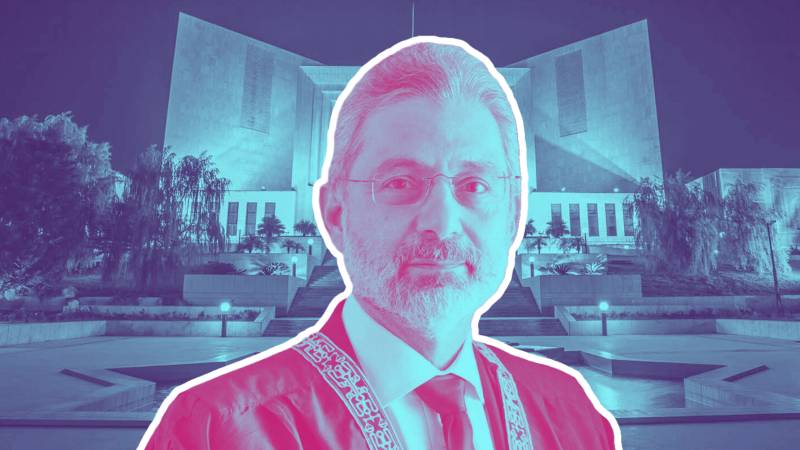
Journalists on Monday were left frustrated after the Supreme Court stopped short of restraining a Joint Investigation Team (JIT) from summoning them to the offices of the Federal Investigation Agency (FIA) as it investigates social media posts criticising judges.
The court spelt out its redlines for what kind of criticism would be tolerated and which would not.
On Monday, a three-judge bench of the Supreme Court resumed the hearing of a suo motu case on the harassment of journalists by the FIA. The bench was headed by Chief Justice of Pakistan Qazi Faez Isa.
Before his elevation to the office of the Chief Justice, CJP Isa was a staunch critic of JITs. He always questioned the legality of JITs and remained an advocate of freedom of expression.
However, on Monday, while distinguishing between criticism and incitement, the chief justice did not pass any order against the JIT, nor did the bench direct the FIA to withdraw notices issued to journalists recently. It had been reported by various media outlets during the day that the court had restrained the FIA from summoning or taking actions against journalists, but this information was inaccurate.
The FIA had issued summons to 46 individuals, including journalists, television anchors, commentators and even journalists, to appear before the agency at its offices in Sector G-13 on Tuesday and Wednesday.
During the hearing, the bench remained focused on the harassment of journalists during the Pakistan Tehreek-e-Insaf (PTI) regime.
The bench briefly touched upon the matter of notices recently issued by the FIA to journalists. The court observed that it was unclear whether the notices were issued to journalists as witnesses or as the accused.
When the Supreme Court Press Association (PAS) President Aqeel Afzal requested the bench to grant a stay on the notices for at least two days, the top court refused to grant any interim relief.
Chief Justice Isa, however, told Attorney General Mansoor Awan that while verbal abuse was a different matter, the federal agency should not take action against journalists merely for expressing criticism.
"The Attorney-General is directed to file separate comprehensive reports with regard to the police investigations of each case and whether charges were framed against any one; reports to be filed within two weeks," stated the written order.
Stating that honest criticism a judgment or an order is not a crime, the attorney general has assured and submitted an undertaking on behalf of the federal government that no coercive action will be taken nor criminal case registered in the matter regarding recent notices by JIT.
The chief justice remarked that he was strongly against curtailing criticism as freedom of the press was enshrined in the Constitution.
"I don't care if you make fun of me, but if you make fun of the judiciary, the country will suffer. You can criticise the Supreme Court, but the Constitution also has some limitations," he said.
"If you think that you are benefiting me or the Supreme Court by stopping criticism, then you are harming [the institution]," CJP Isa remarked.
He added that journalists can criticise court decisions, but incitement was a different matter.
"We can never restrain a common man or a journalist from criticising," Chief Justice Isa observed, adding that the use of foul language was wrong, but criticism was not prohibited.
He further observed that it is wrong to arrest a journalist simply for criticising.
"I don't care, but there should be limits. We will also give rights to those who are not present here. I welcome criticism of myself." he said.
Justice Musarrat Hilali remarked that fair criticism was not a problem, but the language used was wrong.
During the hearing, the chief justice observed that along with hate speeches, some violent incidents take place in the country which are unique to Pakistan, highlighting incidents of targeted attacks on polio workers and attacks on girls' schools.
"Why does the government not do anything against extremist thinking? Why aren't those who prevent women from voting and polio inoculation caught? Look at what happened in Jaranwala, everything is the result of hatred, these people have been used, and now they have become pythons, why did they not arrest the person who gave the fatwa to prevent women from voting?" said the chief justice.
Justice Hilali observed that, unfortunately, earning money through abuse has become a source of livelihood for people.
Following these remarks, the court adjourned further hearings in the case until Tuesday.
Earlier during the hearing, senior journalist Matiullah Jan - who was attending the hearing as a respondent in the 2021 case which the SC had taken up for hearing - requested the bench to set a date for hearing the suo-motu case on Arshad Sharif's murder.

